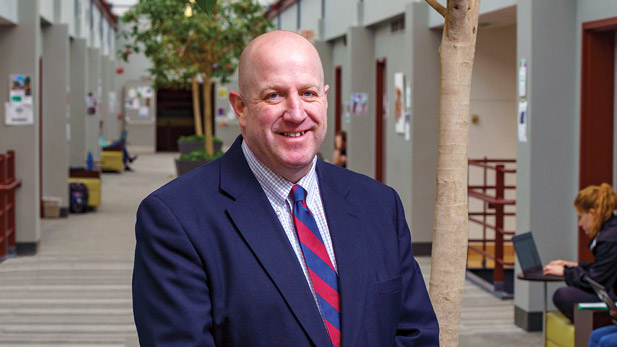Casey Gives International Speech about Margaret Thatcher’s Legacy as British Leader

Distinguished educator and scholar Terrence Casey is president of the British Politics Group of the American Political Science Association and is currently working on a book about Margaret Thatcher’s rise as a British political leader.
Political science professor Terrence Casey, the Alfred R. Schmidt Chair for Excellence in Teaching, discussed the rise of former British leader Margaret Thatcher and her eventual influence on world politics in an invited address Oct. 7 at the University of Hull in England.
Casey’s presentation was featured as the Centre for British Politics’ annual Norton Lecture, and was titled “Forging the Iron Lady: How the 1970s Shaped Margaret Thatcher – and Our Politics Today.” The event was held in honor of the 40th anniversary of Thatcher becoming the country’s Prime Minister in 1979.
“In 1970, Margaret Thatcher was not the historical figure of our collective memory,” says Casey. “It was only as a result of the cascading crises that beset Britain in the 1970s, a period where contemporary commentators described the country as ‘ungovernable,’ that Margaret Thatcher was transformed into the ‘Iron Lady’ for which she became known.”
He adds, “Crisis transformed Thatcher and she in turn went on to remake Britain and the world, leading a free-market revolution that continues to shape our politics and economics to this day. Lessons can also be drawn from this last great period of turmoil and change that can allow us to better understand the disrupted politics of the present.”
Casey is president of the British Politics Group of the American Political Science Association, after being the group's executive director from 2005 to 2014. He is currently working on a book about Thatcher’s rise as a political leader in Britain and an inspirational world leader. Casey’s research interests primarily focus on British politics and comparative political economy.
A member of the Rose-Hulman faculty since 2000, Casey teaches political science, and served as chair of Rose-Hulman’s Department of Humanities, Social Sciences and the Arts from 2009 until 2017. He received the Board of Trustees' Outstanding Scholar Award in 2012.
Casey was named the inaugural Alfred R. Schmidt Chair for Excellence in Teaching in 2018. In this role, he is supporting creation of transformative learning experiences in the classroom on campus and opportunities for national engagement with other exceptional scholars. He also is concentrating on developing courses involving the institute’s first-year international curriculum, including providing faculty-led study abroad courses students can experience as soon as they are accepted into Rose-Hulman.